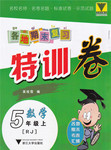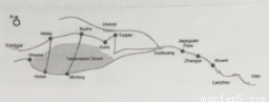
ЃЈЬтЮФЃЉEveryone except Tom and John there when the meeting began.
A. are B. is C. were D. was
D ЁОНтЮіЁП ЪдЬтОфвтЃКЕБЛсвщПЊЪМЕФЪБКђЃЌГ§СЫTomКЭJohnУЛРДЃЌУПИіШЫЖМдкетЁЃexceptКЭbesides СНепЖМЪЧЁАГ§ШЅЁБжЎвтЃЌЕЋЧАепжИЁАЕЋВЂВЛАќРЈЁБЃЌЪЧЁАХХГ§ЁБжЎвтЃЌКѓепжИЁАГ§ДЫжЎЭтЛЙгаЁБЃЌЪЧЁАЭтМгЁБжЎвтЁЃОйР§ШчЯТЃКThere are six of us besides Tom.Г§ЬРФЗЭтЃЌСэЭтЛЙга6ШЫЁЃЃЈвЛЙВ7ШЫЃЉWe all went home except Tom. ... ИїЕиЦкФЉИДЯАЬибЕОэЯЕСаД№АИ
ИїЕиЦкФЉИДЯАЬибЕОэЯЕСаД№АИ аЁВЉЪПЦкФЉДГЙи100ЗжЯЕСаД№АИ
аЁВЉЪПЦкФЉДГЙи100ЗжЯЕСаД№АИ
| ФъМЖ | ИпжаПЮГЬ | ФъМЖ | ГѕжаПЮГЬ |
| ИпвЛ | ИпвЛУтЗбПЮГЬЭЦМіЃЁ | ГѕвЛ | ГѕвЛУтЗбПЮГЬЭЦМіЃЁ |
| ИпЖў | ИпЖўУтЗбПЮГЬЭЦМіЃЁ | ГѕЖў | ГѕЖўУтЗбПЮГЬЭЦМіЃЁ |
| ИпШ§ | ИпШ§УтЗбПЮГЬЭЦМіЃЁ | ГѕШ§ | ГѕШ§УтЗбПЮГЬЭЦМіЃЁ |
ПЦФПЃКГѕжагЂгя РДдДЃКХЃНђвыСжАцЃЈ7AЃЉгЂгяЕквЛЕЅдЊВтЪдОэ ЬтаЭЃКЕЅбЁЬт
Tom _________my new classmate.
A. are B. is
C. am D. be
B ЁОНтЮіЁПЪдЬтОфвтЃКЬРФЗЪЧЮвЕФаТЭЌбЇЁЃTomЪєЕкШ§ШЫГЦЕЅЪ§ЃЌЖЏДЪbeИУгУisЁЃЫљвдбЁBЁЃВщПДД№АИКЭНтЮі>>
ПЦФПЃКГѕжагЂгя РДдДЃККгФЯЪЁеазюКѓ20ЬьбКЬтгЂгяЪдОэЃЈШ§ЃЉ ЬтаЭЃКЕЅбЁЬт
ЁЊWhat do you think of the TV program Running Man?
ЁЊItЁЏs interesting, ________my father doesnЁЏt like it at all.
A. and B. but C. or D. so
B ЁОНтЮіЁПОфвтЃКЁЊФуШЯЮЊЕчЪгНкФПЁЖХмФаЁЗдѕУДбљЃП ЁЊКмгаШЄЃЌЕЋЪЧЮвЕФИИЧзвЛЕуЖљвВВЛЯВЛЖЫќЁЃandБэЪОЫГГаЃЛbutБэЪОзЊелЃЛsoБэЪОвђЙћЃЌorБэЪОЗёдђЁЃИљОнОфвтЁАЫќКмгаШЄЃЌЕЋЪЧЮвАжАжвЛЕувВВЛЯВЛЖЁБПЩжЊЃКЧАКѓСНОфБэЪОзЊелЃЌЙЪД№АИгІбЁBЁЃВщПДД№АИКЭНтЮі>>
ПЦФПЃКГѕжагЂгя РДдДЃКЫФДЈЪЁУМЩНЪа2018НьОХФъМЖжаПМПМЧАдЄВтЪдОэЃЈЮхЃЉЃЈЮоЬ§СІЃЉ ЬтаЭЃКЕЅбЁЬт
It is blowing hard outside. Tell the boy _______Michael _______the window.
A. call; to open B. called; to open
C. called; not to open D. call; donЁЏt open
C ЁОНтЮіЁПОфвтЃКЭтУцЗчДЕЕУКмДѓЁЃИцЫпФЧИіНаУзЧаЖћЕФФаКЂЙиЩЯДАЛЇЁЃЕквЛПезїЖЈгяаоЪЮУћДЪboyЃЌБэЪОБЛГЦЮЊУзЧаЖћЕФФЧИіФаКЂЃЌЙЪгУЙ§ШЅЗжДЪcalledзїЖЈгяЁЃИљОнIt is blowing hard outside.ПЩжЊЭтУцЗчДѓЃЌВЛвЊДђПЊДАЛЇЁЃЖЬгяtell sb not to do sthИцЫпФГШЫВЛвЊзіФГЪТЃЌЙЪбЁCЁЃВщПДД№АИКЭНтЮі>>
ПЦФПЃКГѕжагЂгя РДдДЃКЫФДЈЪЁУМЩНЪа2018НьОХФъМЖжаПМПМЧАдЄВтЪдОэЃЈЮхЃЉЃЈЮоЬ§СІЃЉ ЬтаЭЃКЕЅбЁЬт
ЁЊWhat do you think of TV show called Readers?
ЁЊI like it very much. I think it is wonderful TV show.
A. a; a B. a; the C. the; a D. the; the
C ЁОНтЮіЁПОфвтЃКЁЊЁЊФуШЯЮЊРЪЖСепетИіЕчЪгНкФПдѕУДбљЃПЁЊЁЊЮвЗЧГЃЯВЛЖЫќЃЌЮвШЯЮЊЫќЪЧвЛИіОЋВЪЕФЕчЪгНкФПЁЃВЛЖЈЙкДЪa/anвЛИіЃЌБэЪОЗКжИЃЌaгУгкИЈвєПЊЭЗЕФЕЅДЪЧАЃЌanгУгкдЊвєПЊЭЗЕФЕЅДЪЧАЃЛЖЈЙкДЪtheетИіЃЌФЧИіЃЌЭЈГЃгУгкЬижИЃЛЕквЛИіПеЬижИНаЁАРЪЖСепЁБЕФетИіНкФПЃЌЕкЖўИіПеЗКжИвЛИіКУНкФПЃЛЙЪбЁCВщПДД№АИКЭНтЮі>>
ПЦФПЃКГѕжагЂгя РДдДЃКШЫНЬАцАЫФъМЖгЂгяЃЈЯТЃЉЦкФЉИДЯА Unit8-Unit10 ЬтаЭЃКЕЅбЁЬт
---Lily, why are you still here? School is over for half an hour.
---Because I ____________ my task yet. I still need one more hour.
A. wonЁЏt finish B. didnЁЏt finish
C. havenЁЏt finished D. hadnЁЏt finished
C ЁОНтЮіЁП ЪдЬтОфвтЃКЃРђРђЃЌФуЮЊЪВУДЛЙдкетЖљЃПЗХбЇгаАыИіЖраЁЪБСЫЁЃЃвђЮЊЮвЪТЧщЛЙЮДЭъГЩЁЃЮвЛЙашвЊвЛаЁЪБЁЃA. wonЁЏt finishвЛАуНЋРДЪБЬЌаЮЪНЃЛB. didnЁЏt finishвЛАуЙ§ШЅЪБЬЌаЮЪНЃЛC. havenЁЏt finishedЯждкЭъГЩЪБЬЌаЮЪНЃЛD. hadnЁЏt finishedЙ§ШЅЭъГЩЪБЬЌаЮЪНЁЃБООфЧПЕїЕФЪЧЁАЛЙУЛгаЭъГЩЁБЕФетИіНсЙћЃЌЧПЕїЙ§ШЅЗЂЩњЕФЖЏзїЖдЯждкдьГЩЕФгАЯь...ВщПДД№АИКЭНтЮі>>
ПЦФПЃКГѕжагЂгя РДдДЃКШЫНЬАцАЫФъМЖгЂгяЃЈЯТЃЉЦкФЉИДЯА Unit8-Unit10 ЬтаЭЃКЕЅбЁЬт
Yesterday my brother a story-book from the library, but he
it to Mike minutes ago.
A. lent; borrowed B. borrowed; lent
C. lend; borrowed D. lend; lent
B ЁОНтЮіЁП ЪдЬтОфвтЃКзђЬьЮвЕФИчИчДгдФРРЪвНшСЫвЛБОЪщЃЌЕЋЪЧЫћдкМИЗжжгЧАНшИјСЫТѓПЫЁЃИљОнОфжаЕФЪБМфзДгяЃЌОфжаЕФЖЏДЪЖМгУвЛАуЙ§ШЅЪБЁЃИљОнОфвтЃЌЙЪбЁBЁЃВщПДД№АИКЭНтЮі>>
ПЦФПЃКГѕжагЂгя РДдДЃКББОЉЗПЩНЧј2018НьОХФъМЖЖўФЃгЂгяЪдОэ ЬтаЭЃКЛиД№ЮЪЬт

The Silk Road is the name of different roads that connected Europe, Africa and Asia long ago. It was named by F. von Richthofen, who was a famous German geographer. Scientists believe people began to travel the Silk Road about 3,000 years ago. People reached these different places along these roads. By the time the Chinese silk trade became important in the world, the Silk Road covered almost 7,000 kilometers. It went from Rome to China, which is from the West to the Far East.
Businessmen travelled along the Silk Road to carry silk, of course. They also carried and traded other things like spicesЃЈЯуСЯЃЉ, cloth, jewels and gold.
Along and around these ancient pathsЃЈаЁТЗЃЉ, have come many fascinating and mysterious stories.
It is said that Roman soldiers who lost a war travelled through central Asia. They decided to live somewhere near the ancient Chinese villages. Some of these Romans married local Chinese women and the stories of the blondhaired, blueeyed tribes of China was started.
Some historians believe that the people of Kashmir were taken away from their country Israel. They were prisonersЃЈЗ§ТВЃЉ of war almost 2,800 years ago. People say that these people travelled along the Silk Road. They kept their Jewish way of life for a long time.
During its busiest period, the Silk Road allowed people from many different cultures and countries to meet each other and mix. The Silk Road allowed the sharing of valuable things and new ideas. It included people and trading goods from different areas. All these peoples travelled the Silk Road, and they shared goods, stories, languages. and cultures.
In modern times, the old Silk Road routesЃЈТЗЯпЃЉ are still used, but now they are crossed by trains instead of camels and horses. There is even a Silk Route Museum in Jiuquan in China. It has over 35,000 objects from all along the Silk Road. In this way, China protects the history of many countries and peoples.
1.Who gave the name "Silk Road" ?
2.How long was the Silk Road?
3.What did people trade along the "Silk Road" in the past?
4.Did people share languages and cultures along the Silk Road?
5.How does China protect the history of Silk Road?
1.F. von Richthofen 2.Almost 7,000 kilometers. 3.Silk, spices, cloth, jewels and gold. 4.Yes, they did. 5.China built a Silk Route Museum in Jiuquan. ЁОНтЮіЁП ЪдЬтБОЮФНщЩмСЫЫПГёжЎТЗЖдЖЋЮїЗНОМУЮФЛЏНЛСїЕФгАЯьвдМАдк...ВщПДД№АИКЭНтЮі>>
ПЦФПЃКГѕжагЂгя РДдДЃКаьжнЪавЕЫЎЦНПМЪд ЬтаЭЃКЬюПе
дФЖСЖЬЮФЃЌИљОнЫљЖСФкШндкЮФеТКѓБэИёжаЕФПеИёРяЬюШывЛИізюЧЁЕБЕФЕЅДЪЁЃ
You may think that English dictionaries have been used for many, many centuries. The spelling of English has always been a problem, but it was more of a problem in the days before a dictionary. In those days people spelt words in different ways which you might find interesting. But it made reading English much more difficult. So dictionaries were invented to encourage everybody to spell the same. In fact, an English dictionary like the kind you use today wasn't made until the time of the Qing Dynasty.
The largest dictionary in the world is the Oxford English Dictionary, or OED for short. The idea for this dictionary came from an important meeting in Britain in 1857. Twenty-two years later, Oxford University asked James Murray to be the editor of its new dictionary.
Murray had not been to college. At the age of fourteen, he left his village school in Scotland and taught himself while working in a bank. Later he became a great teacher. After Oxford gave him the job, Murray had a place built in the garden behind his house to do his work. Part of it was one metre underground. In winter he had to wear a heavy coat and put his feet in a box to keep warm. Every morning, Murray got out of bed at five o'clock and worked several hours before breakfast. Often he would work by candle light into the evening.
Murray hoped to finish the new dictionary in ten years. But after five years, he was still adding words for the letter A! Then others went to work with Murray, and his two daughters were among them. He worked on the dictionary until he was very old. Forty-four years later, in 1928, other editors finished it. It had more than 15,000 words in twelve books. And you thought your English dictionary was big!
Notes on James Murray's life | |
Murray's early life | Born in Scotland. He left school at 14 and became a1. worker, later a great teacher. |
Murray's work on OED | He became the editor of OED in the year2.. His working3. were bad: ЁЊhe worked in a part-underground place in the garden4. his house ЁЊin winter it was terribly cold there ЁЊhe often worked by candle light into the evening The time he spent on OED was much5. than expected. Later others and his two daughters6. him. |
Other information . | OED was finished in the year 1928. It had over 15,0007.in twelve books. It is the8.dictionary in the world. Thanks to it, people can9. in the same way. For Murray, working on a dictionary wasn't only a10. ; it was a wonderful journey. |
ВщПДД№АИКЭНтЮі>>
АйЖШжТаХ - СЗЯАВсСаБэ - ЪдЬтСаБэ
КўББЪЁЛЅСЊЭјЮЅЗЈКЭВЛСМаХЯЂОйБЈЦНЬЈ | ЭјЩЯгаКІаХЯЂОйБЈзЈЧј | ЕчаХеЉЦОйБЈзЈЧј | ЩцРњЪЗащЮожївхгаКІаХЯЂОйБЈзЈЧј | ЩцЦѓЧжШЈОйБЈзЈЧј
ЮЅЗЈКЭВЛСМаХЯЂОйБЈЕчЛАЃК027-86699610 ОйБЈгЪЯфЃК58377363@163.com